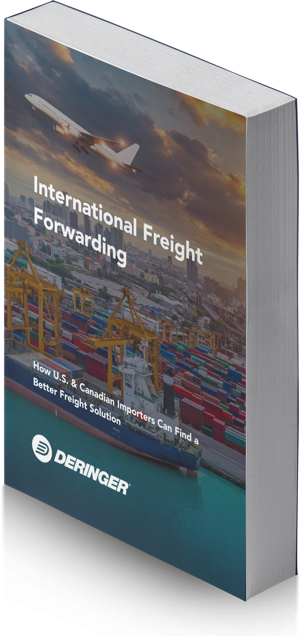These are a few of the most common frustrations U.S. and Canadian importers have with their freight forwarders, and these problems can often be traced back to the beginning of the process. A freight forwarder can help you with shipping logistics, trade compliance, and get your goods where they need to go. However, success depends, to some extent, on how prepared the importer is at the beginning of the process.
If you are reevaluating an existing partner, or looking for a new one to work with, this guide will help you ask the right questions and get prepared for a more successful partnership with your international freight forwarder:
This guide will also demonstrate actionable ways to assess and derive more value from a freight forwarder that also provides Customs consulting. It will be most useful if you:
Fill out the form for a downloadable PDF version of the guide you can reference later.

The freight forwarding industry has grown over the last several years, and that growth means individual companies offering services to importers must become more competitive.
It’s a buyer’s market, and you, the importer, have more choices and more decision-making power. Selecting a high quality freight partner will help you remain in compliance and ultimately get your goods to their destination as efficiently and cost-effectively as possible.
There are a number of nuances to consider when comparing freight partners, and it’s important to make sure you are comparing apples to apples. Deciding who to work with is not as simple as comparing quotes for shipments. Most importers go into the process looking for a long-term relationship, not just a single transaction—so it’s worth putting some thought into.

If you want to work with a freight forwarder that offers Customs brokerage services, you should start the process with some advance knowledge of your freight and come prepared with certain documents. This will enable your Customs broker/forwarder to seamlessly handle various aspects of importing and perform essential services. Understanding your role and theirs in this relationship will lead to a long and productive relationship.
First, your purchasing or compliance manager should be well versed in the goods they’re shipping. Importers should be prepared to provide their partner with:
To avoid liability issues, you should know the country of origin where the product was made, and provide documentation in English along with commercial invoices or proof of actual price paid for the goods. If the country of origin is unclear because the product was manufactured in multiple countries, such as sub-assembled parts from one country going into a product finished in another country, then it becomes even more critical that your freight forwarder is an outstanding Customs broker so they can help make a country of origin determination.
For many reasons, it’s crucial to have this information documented. As an example, if the product is made in a location whose labor practices violate U.S. human rights laws, the importer will be held accountable even if they didn’t know they were breaking the law. When the proper documentation is not provided, or if the information is incorrect, the shipment may be flagged by Customs and delayed. Furthermore, the transportation practices and processes at overseas origin can differ widely by country, so it’s even more integral that your freight forwarder has Customs brokerage capabilities to navigate the flow of goods and regulatory pathways.
Turnover in an importer’s staff, such as when a new purchasing manager or compliance manager joins the team, provides an opportunity to take a fresh look at the cost-efficiency and functionality of your existing freight partners.
If you happen to be this new person on the job, or if you suspect the company is overspending on freight, it’s worthwhile to evaluate the forwarder you’re using as a starting point.
As you formulate your assessment, you’ll want to examine records that help create a narrative about the relationship. Start by finding answers to the following questions:
If any of these items are missing or inconsistent, you can consider it a red flag. Looking closely at billing details is one area many people skim over. Even if the quotes match the billing amount, it’s essential to verify the classifications are correct.
Consolidating your freight and brokerage services into one provider offers several benefits to importers. These forwarders typically offer an array of tools and resources that help you manage your freight, helping you get the most out of your agreement with them and making business management easier.
Transportation management software can help importers visualize their shipments throughout the entire supply chain. It’s kind of a one-stop-shop for tracking. Instead of looking up different legs of the shipment, which takes more work to see a big picture view, transportation management software allows you to view it all in one location.
Document dashboards that house workflows and filings for specific individual shipment processes provide a simple flagging system for missing paperwork. These systems manage by exception, rather than forcing you to run reports yourself to examine shipment flows for holes in the process. You’ll be notified of upcoming entries and arrivals. When everything is running smoothly, you’ll see your list of shipments that are all green-lighted, and you can focus on other tasks.
Freight forwarders with Customs brokerage capabilities possess a wealth of resources they can make available to you. In-house industry expertise will be available to answer specific questions you may have about importing and compliance for inbound freight. Your broker may also offer email updates, webinars and seminars that address frequently asked questions or regulatory changes. For example, if several importers come to them with questions about incoterms, they may offer a seminar that helps customers brush up on them

With many freight providers, there’s lots of red tape between you and the person you need to talk to. If you have to make ten different phone calls to get an answer to a question about a shipment, and another ten phone calls to various offices when you need information about a new FDA regulation on inbound freight, you can do better. Many Customs brokers/freight forwarders offer a single point of contact for everything from shipment bookings to regulation inquiries to entry filings, even when you have shipments arriving in both Los Angeles and Boston.
Billing is a critical area to stay on top of as a purchasing manager or compliance manager. Good oversight involves drilling down into the details of the bill, comparing invoices, quotes, and entries, as well as making sure everything is delivered on time.
Invoices should be accurate and include all supporting documentation that relates to the itemizations associated with that shipment. If this sounds like a lot of paper to keep track of, you’re in luck. Most logistics partners offer electronic billing, which allows you to log into a system and study your billing and back-up documentation online.
When you receive a bill, there are two things you should look for right away.
Take the time to compare your invoice with what you were initially quoted. Some providers will omit certain fees on the quote, or offer rates that could change in a matter of days, in hopes of winning your business. Chassis late fees and volatile shipping rates are just a few unpleasant surprises you might see on your invoice.
Many factories will quote the weight and dimensions of your products based on pre-wrapped or palletized items, and these rates may differ from what you were quoted. This is easy to avoid by just asking your factory to quote based on the post-wrap specs.
Certain situations can’t be accounted for in your initial quote, like severe weather or labor strikes, but most variables can be addressed on your initial quote if your freight forwarder is transparent about their pricing.
Communication with your freight forwarding partner will be ongoing, and it can take a number of forms.
When your freight forwarder is also your Customs broker, trade alerts will arrive in your email inbox almost daily. These news-based messages will keep you apprised of industry happenings that impact productivity, such as port/trucking strikes, new terminal fees, additional duties, Customs compliance changes, policy changes related to inbound freight, and international trade updates. If, for instance, the President of the U.S. makes a change to international trade relations, you will receive information via a newsletter or trade alert that explains how the change or proposed change will affect your shipping. Or, if there’s a trucker strike in India that affects your land transport from factory to port, or delays the departure of your ocean/air bound freight to the U.S., you’ll be updated

Your freight forwarding partner should be able to outline a contingency plan and advise you directly about when you should think about alternate sourcing. These conversations often occur on short notice, especially when a port strike pops up in a country you’re shipping to or from. In this case, your Customs broker/forwarder should contact you, and propose rerouting the freight through another port or advise alternate modes of transport, such as changing the shipments from ocean to air. A good freight forwarding partner will be sensitive to advance planning and spot potential snags in the freight flow that could negatively impact your bottom line. If Christmas is a few months away and your freight hasn’t left the origin from some reason, a fast, expedient plan of action could yield a positive outcome.
When your freight forwarder is also your Customs broker, they’ll advise you on other changes too. If you manufacture and ship shoes, for instance, and the product is coming in from China, the goods may be subject to new tariffs and additional duties. Tariff engineering, in the form of changing your product composition, might shift your product into a different tariff classification and help you avoid excess duty. If the shoes have leather uppers and not synthetic uppers, let’s say, this would change the tariff classification and, therefore, may alter what duties you pay. Alternatively, it might make sense to source the shoes elsewhere.
Quantifiable data on a logistic partner’s compliance record may include litigation, fines, and audits, but there’s no score card you can pull online.
If a company is hit with a fee by the government for not following import or export regulations, that may be the only time you’ll see any kind of public record that tells you something about their compliance success. Because this data is scarce, knowing what questions to ask when you’re evaluating a freight forwarder and monitoring the components of compliance is key. Here are a few questions you could ask:
Rates that aren’t competitive or frequently late arrivals are cause for concern. If you have a shipment coming to Canada from Germany that was quoted at $2,000, but the invoice includes a chassis fee and a handover charge, your partner’s pricing lacks transparency.
In the international shipping industry, there are many details to keep straight and variables that can change when you least expect it, so it’s important to make sure expectations are set and workflows are mapped out as clearly as possible.
Documentation is important for both you and the forwarding partner because, although you are both working to maintain compliance and efficiency, the responsibility falls on you, the importer.
Clear documentation in the form of standard operating procedures (SOPs) keeps everyone on the same page so no steps are missed, and freight doesn't sit somewhere without a truck scheduled to pick it up.

Ideally, an SOP will be composed for each type of international movement with details at the trade lane level for further specificity. So, you’ll create an SOP for your ocean imports and exports, your air imports/exports, Customs brokerage, and warehousing and distribution. And if one trade lane ships both air and ocean, you’ll have documented instructions for both scenarios.
Each SOP should include the following information and documentation:
For a large company that handles a lot of imports, the SOP could be several pages long, and it will keep your communication and expectations with the freight forwarder clear and organized.
They’re also important for unexpected absences. If you’re on vacation or out sick, someone else can refer to the SOP if a question comes up and put together the pieces so the freight moves without missing a beat. You should update your SOP regularly so that it’s always up-to-date in case you miss work, or in case someone new transitions onto your team.
As you begin working with a freight forwarding partner, developing a mutual understanding of not only the intricacies of your shipping needs, but also your expectations for service is critical for a successful partnership.
If you’re trying to get goods from Shanghai to Los Angeles in time for Black Friday, speed to market may be a significant value to you. However, if you’re looking for a freight forwarder based on quotes from Shanghai to Los Angeles alone, and speed to market hasn’t entered the conversation, you may be in for an unwelcome surprise. The quote the provider gave you might be the best quote they can offer, but it might not be the fastest transit time they can provide. If you’re getting low quotes from one company, but incurring $60,000 worth of demurrage at port, a higher quote might be worth opting for in the long run to avoid fees on the back end.

A thorough conversation about expectations and needs when it comes to costs and transit times can help you choose the right freight forwarding partner. It helps create clarity on the terms of the agreement so there aren’t any surprises and the details and timelines on your SOP are accurate. It also helps reduce errors that occur due to poor communication. Keep in mind, too, these values can change over time. Perhaps speed to market was once a top priority, but if your company is downsizing and needs to cut costs, a slow boat from China may actually be exactly what you need to save money. As you’re considering the value of your investment with your current freight forwarder or Customs broker, don’t forget about those other benefits mentioned here. A company that can offer educational resources, seminars, and online tracking tools that give you exception-based management opportunities, and ultimately make your job easier, will save you money down the road.
Some freight forwarding providers will have their own offices stationed abroad, and others will use contracted agencies. There are benefits and drawbacks to either scenario.
A global company that has its own offices in Hong Kong, Shanghai, and Frankfurt might have seamless operations and customer service in Hong Kong and Shanghai, but every time you deal with the Frankfurt office, it’s a mess and there’s nothing you can do about it.
A company that contracts with different agencies in different cities has the luxury of making changes when one agency or location isn’t performing well. If their Frankfort agency is making mistakes and the quality of service is poor, they can sever that relationship and find an agency that does the job better.
A provider that uses agencies for various parts of the freight forwarding service can simply hire a different trucking company if their truck deliveries are too slow. A multi-national company would not be able to make changes to city-specific performance as quickly. Freight forwarding partners who work with outside agencies have a vetting process for selecting which agents they use. Agencies must be financially sound and well-versed in the line of business they provide. The freight forwarder looking to contract with them will research how much volume they move, look at their relationships with steamship lines and airlines as well as their performance in those lines of business, and ask about the carriers they rely on. They’ll also look at their network, and whether they have offices throughout the country they’re in and how well that network operates.

A larger company with its own international offices may have less flexibility in other ways, too, such as flexible routing options that help balance your cost and speed of transit. There are some routes they may not use because it’s not part of their network, which limits their ability to customize rates and options for your needs. Because of this difference, freight forwarders who use outside agencies or contractors allow for greater flexibility and higher quality service in most cases.
Agency partnership networks, such as the Worldwide Independent Network (WIN), is an association that facilitates intercountry connection. It’s a limited membership, and companies work together to accomplish shipping goals in countries where there are less established relationships and networks. Member profiles include those high-quality freight forwarders who contract with agencies independent from their own in their native countries. A benefit of hiring a forwarder with agency representation is the local knowledge the agency brings; whereas transplants from the U.S. might manage one of the international offices of a larger company, but they won’t have the insight of a native forwarder.
Members and associate agencies are rigorously vetted and work together to share information that ultimately benefits all the members and their customers. They may assist with moving shipments for one another when it’s beneficial to do so. If the freight forwarder you’re considering is a member of WIN, think of it as a gold seal of approval.
It should come as no surprise that the technological connectivity of our era has spilled over into international freight forwarding.
A transportation management system compiles data and gives customers access to all the information they need to track their shipments in a single system. The TMS allows you to dive into the details of your shipments and look at virtually anything you want to know concerning its journey. You receive login information for the system, and the system allows you to visualize shipping for all trade lanes, modes of transportation, and products. You put in your shipping bill number and can see where all of your shipments are in their journey. You may see something resembling a map or reports that indicate where your cargo is and all of the related timelines for each leg of its scheduled delivery.
Transportation management system software is a powerful tool that will make you and your employees’ lives easier.
There’s much to consider when evaluating your freight forwarder or shopping for a new one. Getting an RFQ just won’t cut it.
This relationship is one you might have for years. It can either make your job easier or give you headaches, so make sure you’re getting the best service you can by looking more closely at billing, asking about the extra services offered to you in your agreement, and paying attention to the quality of shipping execution once things are in motion. Look at the details and make a note of trends in performance. At the end of the day, you will succeed by doing business with the people and companies you feel comfortable working with and who give you the best possible service and value.
When you select Deringer as your supply chain partner, you can trust that your business is in the hands of dedicated, knowledgeable professionals, who have a strong commitment to carrying on the company's legacy of exceptional customer service. Our caring people work with you to develop tailored solutions that improve efficiencies, reduce overall supply chain costs, and manage the risks associated with global trade.
About Deringer
Trade Industry Leadership
Location

Copyright © 2024 A.N. Deringer, Inc.All Rights Reserved.Privacy Policy | Terms & Conditions | 19 CFR § 111.29(b)(2)(ii) Notice of Method of Payment